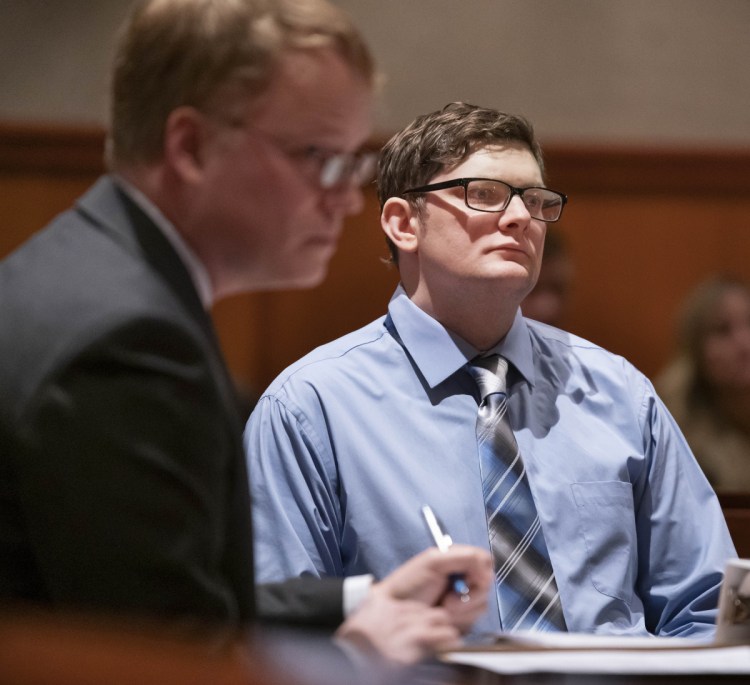A judge is considering whether a Windham man’s comments to members of his church can be used as evidence in his upcoming trial for the fatal shooting of his wife.

Alicia Gaston
Last week marked three years since 34-year-old Alicia Gaston died from a single shot from a shotgun in the stairwell of the family’s home on the morning of Jan. 14, 2016. Noah Gaston, now 36, has said he mistakenly thought that his wife was an intruder when he pulled the trigger, but police have pointed to inconsistencies in his story from the start.
Gaston was arrested and pleaded not guilty to charges of murder and manslaughter. He has been held without bail in the Cumberland County Jail ever since.
Following repeated delays in the case, Gaston will finally stand trial in February.
On Tuesday, prosecutors from the Maine Attorney General’s Office and Gaston’s defense team argued in a Cumberland County courtroom about whether the jury should hear certain evidence, including the statements to fellow church members and the lyrics of a song Gaston was writing at the time of the shooting. Superior Court Justice Michaela Murphy did not immediately rule on those issues and scheduled an additional hearing for next week.
Gaston attended the hearing Tuesday in Portland and sat quietly between his attorneys, not speaking or reacting to the arguments.
Defense attorneys James Mason and Rob Andrews cited what’s known as religious privilege in asking the judge to block the testimony of two men who knew the Gaston family from their church.
The two men picked up Gaston at the police station on the day of his wife’s death, according to court documents. They later told investigators that he recounted the shooting, including seeing the figure he believed to be an intruder. Gaston then told them that was the only story he could tell if he wanted to see his kids again, according to the police affidavit.
Gaston’s attorneys have argued that the two men are leaders in their church group, and those conversations should be excluded from the trial, citing religious privilege. The Maine Rules of Evidence allow a person to protect confidential communications made to a member of the clergy acting as a spiritual adviser.
But Assistant Attorney General Meg Elam said the state does not consider the men to be members of the clergy, and the privilege should not apply to them.
The men were not in the courtroom Tuesday, and Murphy requested another hearing so she could listen to their testimony and make her ruling.
Jim Burke, a clinical professor at the University of Maine School of Law, said the most common example of religious privilege is a private confession to a priest, but the judge does have other ways to interpret the rule. “The range of possible options are so large, and they are so fact-specific,” Burke said.
The testimony of the church members also could touch on another piece of evidence the defense wants to exclude – the lyrics to a song Gaston was working on before his wife’s death. During his car ride with the men from his church, Gaston talked about the song and described it as prophetic, according to the affidavit.

Justice Michaela Murphy addresses Assistant Attorney General Meg Elam during a hearing Tuesday about admissible evidence in the trial of Noah Gaston. The trial is scheduled to start in February at the Cumberland County Courthouse.
“I’ve known sin that was great, held the stone, felt the weight,” he wrote in one verse. “Among brothers, I know I am the lesser.”
The defense lawyers argued the lyrics are prejudicial, but the state hinted that they will use the words to show intent.
“It goes to what he was thinking during the time of this incident,” Assistant Attorney General Paul Rucha said.
The prosecutors asked the judge to allow the jury to visit the Windham house where the shooting took place. This practice is called a “view” and is uncommon mostly for practical reasons. The state built a replica of the stairwell that could be used at trial, but the prosecutors argued that jurors needed to actually be in the house to understand the relationship of one room to another. The judge questioned the parties about whether the house has changed and said she would wait until the trial begins to rule on that question. Murphy visited the house before ruling on an earlier matter in the case.
Thea Johnson, an associate professor at the University of Maine School of Law, said the judge will need to decide whether a view would help or mislead the jury. Re-creating the exact conditions of light and sound is difficult to impossible, she said.
“The real question will be, are there risks of it being prejudicial?” Johnson said. “Are there risks of it in some way not accurately reflecting what it looked like that night?”
The trial will begin at the Cumberland County Courthouse in Portland on Feb. 11.
Murphy already has made significant rulings on evidence, finding the case cleared the legal hurdle required to bring a murder charge but also rejecting a claim by police that the couple’s then-8-year-old daughter heard her parents arguing before the shooting.
Comments are not available on this story.
Send questions/comments to the editors.


